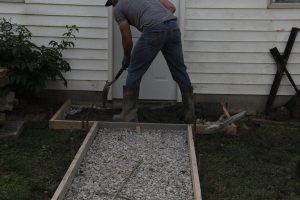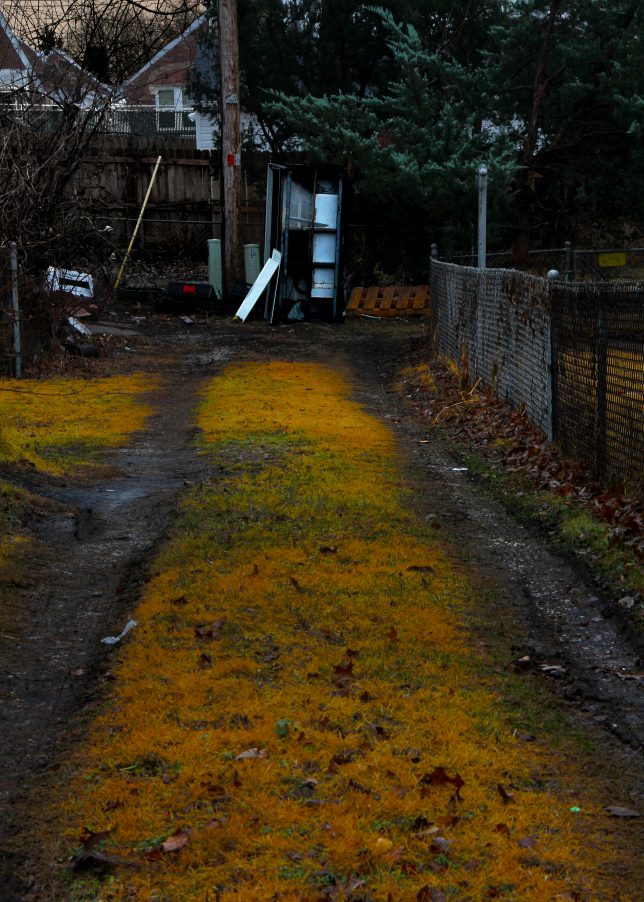Once in a while, something comes along to knock us out of our course, drives us to take a look at things from a perspective long discarded, and calls upon us to reassess. Shocks that set us not only back but prompt the kind of deep re-evaluations we sometimes believe we do all the time. It’s fair to say one such shock is this election just past, which many of us, on both sides of the political divide, are puzzling over, conservatives no less than liberals.
Coming upon the heels of that we may be fortunate to find a book or two, hear a lecture, find revelation in an analysis that brings us up short and calls into question everything we took for granted for, well, decades.
Thomas Frank, known for his first book, What‘s the Matter With Kansas?, most recently published such an examination—Listen, Liberal is as complete an indictment of the Democratic Party and the assumptions of liberalism as I have seen in one place in many years. What is particularly troubling for me—and perhaps for many like me—is that all the points he raises are based on history which I knew, events that I remember, paths taken that at the time seemed inevitable, but which I never interpreted this way. I indulged a fairly banal process of explaining it to myself so that all these things became acceptable, even normal, in a way that now, looking at the shambles of where I always thought we were headed, I find bewildering. None of us, ever, are free of self-deception, especially in the face of specific alternatives we find unacceptable at the time.
Then Frederick Dutton, Democratic Party power broker, went farther: he identified workers, the core of the New Deal coalition, as “the principle group arrayed against the forces of change.” They were actually, to a certain degree, the enemy. Dutton acknowledged that it was strange to contemplate such a reversal of the moral alignment that had put his own party into power, but you couldn’t argue with history. “In the 1930s,the blue collar group was in the forefront,” Dutton recalled. “Now it is the white-collar sector.” Specifically: “the college-educated group.” That was who mattered in the future-altering present of 1971.
This was in the aftermath of the 1968 debacle of Democratic failure which put Richard Nixon in office and announced the coming Age of Plutocracy which has come upon us with the inevitability of an ice age glacier. The “student” movements of the Sixties aligned with the perceived betrayal of the Johnson Administration over Vietnam and the chasm of perception between generations that placed the youth movements on the opposing side against their traditionalist parents’ generation. The Republicans capitalized on the Old Guard vote in the wake of Johnson’s resignation and the year of political chaos that was 1968. The anger exploded in Chicago and the Democratic Party leadership saw the future as one in which the educated class would be the group to court.
Yet somehow this was seen as something that had to be done at the expense of labor, which was suddenly perceived as hopelessly archaic, a drag on change. Even though Labor, as an organized body politic, was still solidly Democratic, they were seen as a burden. Of course, they were also seen as a reliable source of votes. They were, in short, taken for granted.
This is the story Frank narrates in his new book and it is a hard thing to realize how correct he is. That basically the Democratic Party—and by extension America itself—left Labor in the ditch and committed itself to fostering a class of voters who are in many ways indistinguishable from the so-called upper 10%, if not in money then in aspirations. And it is in those aspirations that the tale is told most painfully, because we have witnessed the betrayal even of them, despite the fact that they are exactly who the Future was supposed to be about.
I have a slightly different take on the path Mr. Frank describes. I remember all that with a different emphasis.
My parents were born during the Great Depression. One thing that bound many of them together, ideologically, was a conviction that their children and grandchildren would not have to suffer through what they did. They were solidly blue collar people. College was a fantasy for most and I think it was understood that the upper reaches of white collar sinecure would always be for the few. But they would try. If at all possible, they would get their kids into college. I remember my father telling me that he wanted me to be able to make a living without having to cut my fingers. Also, the assumption for many was that white collar was more secure, despite the realities at the time that union jobs represented the better security.
They succeeded beyond their wildest expectations, but it didn’t turn out the way they hoped, for many reasons.
The other thing was the Space Race.
I know, this seems an unlikely cause of our present calamities, but consider—with Sputnik, the United States entered into a technology showdown of unprecedented configuration. We were suddenly in a do-or-die competition over knowledge-based innovation. This was a Cold War initiative that got sold to the public in the guise of exploration—which it was, in many of its parts—so we could count political coup and perfect missile technology along the way. Industry had to be conjoined with science and for the coming Age of Space we needed scientists and engineers—not Teamsters or Auto Workers. The National Science Foundation made a big push to transform education to meet the coming requirements. Education had to be remade.
The experiment turned out to be a disaster in slow motion. In spite of the success of the space program, teachers found themselves at odds with the new requirements, students were being short-changed in basics, the ability of the massive edifice of public education to turn on a dime and create the Future turned out to be a pie-in-the-sky wish. And of course in the midst of all this came the convulsions of the Sixties, by the end of which even the basic assumptions of education were called into question, along with all the confidence in government that had existed since FDR. Unions were seen more and more as stodgy repositories of old school billy-club thinking (not without some justification—but there’s the rub, of course: all of this transpired with “some” justification), more in the way than not.
(My father was screwed over by his union over technological innovation. This was a real thing. Many unions sensed the coming problem all this innovation was bringing, because the basic question that was asked last if at all was “What about the displaced workers?”)
We were about to Build The Future. As of 1969 we were on the Moon, we were going to the other planets, space stations would soon be orbiting the planet, the future the future the Future!
And it didn’t happen.
Instead we were made ripe for a political realignment that sidelined Labor in the name of that Future which was then turned into a source of votes to undo the New Deal. Instead of going to Mars, we got the Shuttle; instead of universal healthcare, we got the benefits of skyrocketing medical technology along with skyrocketing costs the government refused to take on, leaving more and more people unable to pay for what should have been medical care the envy of the world; instead of full employment, we got a war on the poor and demands for “welfare reform” that created a permanent underclass of poor by which management threatens workers with banishment if they unionize or demand a fair share of the burgeoning wealth owned by fewer and fewer.
All aided and abetted by a Democratic Party that decided its political fortunes were best cast with those people who didn’t want to cut their fingers to make a living.
Frank calls it the Professional Class. These are the people who don’t join unions because they more or less see themselves as independent contractors, quasi-libertarians, loners, wannabe entrepreneurs. Without benefit of the formal structure, they also make up one of the strongest unions in history because they keep nonmembers out more effectively than any organized union ever did. They do it by social category, not by skill set or paid dues. Although if one wished to see it this way, college degrees represent paid dues of an extortionate level. They like to believe they represent a merit-based social hierarchy, but in fact out-of-the-box skills trouble if not frighten them. The idea that someone may be able to “do what they do” and in some cases do it better without benefit of matriculation through the unofficial union membership program they prefer is inconceivable and anyone who comes along to show that this is an error on their part is not welcomed for his or her abilities but shut out because they have rough table manners.
And just as the base of the GOP seems unable to see how their party is not doing well by them, these shiny professionals are dismayed by their party’s inability to challenge the GOP on the state and congressional level because the Democratic Party is serving a class that is simply in most ways too like Republicans to draw a base of natural allies, namely Labor.
What should be a merit-based society has become what might be called a Credentialist Society, which is not the same thing, though in many respects the two resemble each other. Bernie Sanders’ call for free college is a blunt attack on the chokehold universities have on who is or is not to be allowed to participate. The price of that union card has grown all out of proportion to the benefits it confers on the membership.
There’s nothing anti-American about this, though. While we boast of our founding as a nation of immigrants and a society based not on pedigree but ability, the fact remains that we have a history of exclusion, attempts to keep certain people out. We are functional snobs. Real equality scares us, because individually we fear we won’t measure up on a level playing field. Some of us, anyway. And both parties have played on that fear to achieve essentially the same result. While the Republicans are an Us vs. Them party for the rich, the Democratic Party has become an Us vs. Them party representing those who want to be the rich—and feel like they have a shot at it if they can just find a way to free themselves of their declassé roots. Consequently, most of us have been left in the lurch.
A friend of mine who is a thoughtful conservative once told me, when I asked, that one of the things about the Democratic Party that troubled him most was its racism. I thought that was odd, since in recent years it was fairly obvious that most of the racists seem to adhere to the Republicans. I’ve since rethought that. Not that I believe the racism of the GOP is any less real, but the Democratic Party exhibits a kind of circumstantial racism, a racism by default because the economy has been engineered in such a way to assign poverty along broad racial lines, casting such people into labor pools that suffer the most when the jobs are lost and technology displaces them and the housing prices of the upwardly aspirant make it impossible for them to live in desirable neighborhoods. The Democratic Party would rather fob them off with entitlements than do anything to address the economic situation that makes them, essentially, the Left Behinds. The GOP at least is more honest in saying they aren’t interested in those people at all, if not in word then deed.
But going back to Thomas Frank’s argument, the Professional Class is where we all wanted to be. And we didn’t want to be unionized because unions are drags on upward mobility—or so we believed. We collaborated in the current situation by failing to understand our own preferences—our own prejudices.
Which has brought us to our current situation.
There is nothing natural about the the 1%. There is everything natural about their success. Why? Because that’s who we wanted to be. Many of us. And we went along with changes in our political reality because we were told that the Future was going to come about by virtue of innovation and technology and the concomitant methodologies of investment portfolios and fey capital. We were played—by both parties in their own way, yes, but also by our own conceits.
There are a number of quibbles I have with Mr. Frank’s narrative—those technological innovations are not phantoms and are having very, very real effects on the way work is done. The reality we have now is that we simply do not need as many people to make all the things we need to have made. When Obama talked about “shovel ready” programs, the reality he evoked no longer pertained. When Roosevelt did that, building a highway could employ ten or twenty thousand men. Today a hundred people can built that same road. What we have failed to realize is that while the labor requirements of the mid-20th Century no longer pertain, neither should the economic structures of the 19th Century, which is what we have. Just because a business owner can do the same work with less than half the workforce previously employed doesn’t automatically mean said owner gets all that money personally. “Share in the wealth” used to mean one thing by participation in its creation, but the human component in that creation has changed and now it means something else.
In any event, I recommend Thomas Frank’s new book. Argue with it, by all means, but if nothing else it should dislodge preconceptions and open us to the possibility of redoing our political expectations.
 pad to door when we originally moved in had lost their charm. Winter especially proved awkward and we agreed that this was but an accident waiting to happen.
pad to door when we originally moved in had lost their charm. Winter especially proved awkward and we agreed that this was but an accident waiting to happen. Scott Schilling and two young men arrived around nine and went to work. They moved all those stones, piled them up, and started excavating. I spent the time doing other chores and some writing and occasionally emerging to document the process. (Because, like the kitchen remake, I knew I’d be writing one of these.)
Scott Schilling and two young men arrived around nine and went to work. They moved all those stones, piled them up, and started excavating. I spent the time doing other chores and some writing and occasionally emerging to document the process. (Because, like the kitchen remake, I knew I’d be writing one of these.) The rest will be an ongoing project, to be completely (mumbled-snook, farfle) later.
The rest will be an ongoing project, to be completely (mumbled-snook, farfle) later.
















